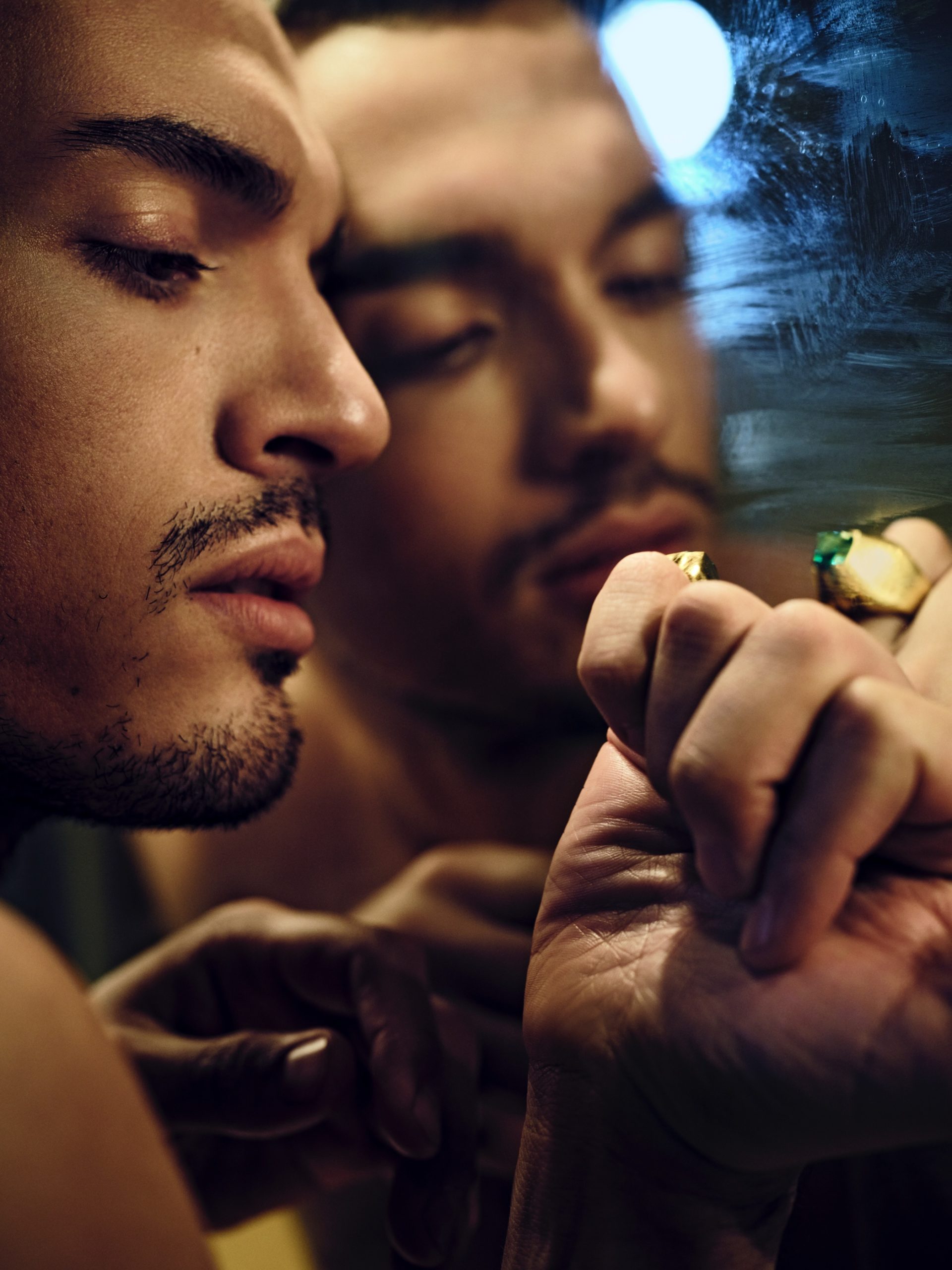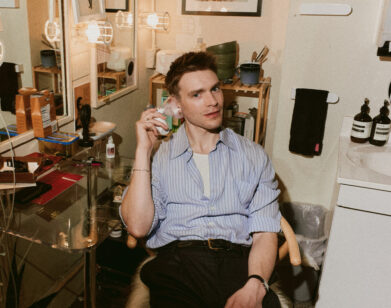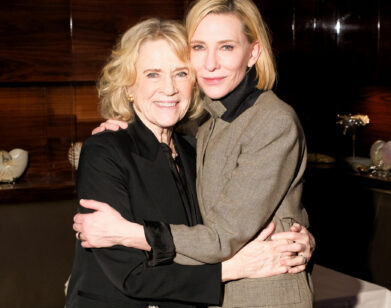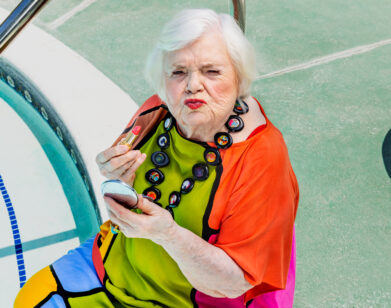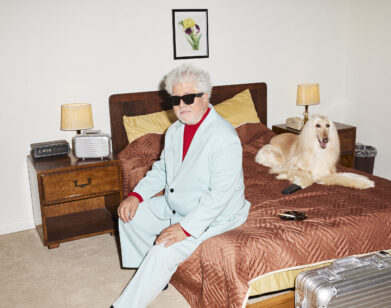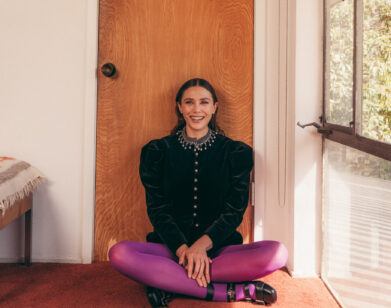in conversation
With a Little Help from Julianne Moore, James Cusati-Moyer Is Learning to Love the Camera
Memorable performances, regardless of the medium, tingle the skin and rattle the brain. The one delivered by James Cusati-Moyer as Dustin in Jeremy O. Harris’s culture-defining and history-making Broadway show Slave Play is no exception. It should be a surprise to no one who saw it that the 31-year-old actor, who made his Broadway debut in 2017 with Six Degrees of Separation, is now nominated for the Tony Award for Best Performance by an Actor in a Featured Role in a Play—one of the 12 nominations for Slave Play, which broke the record for most nominations for a non-musical. Having previously appeared on TV shows such as Unbreakable Kimmy Schmidt and Blue Bloods, Cusati-Moyer is taking his resume to the next level with his upcoming project, the Shonda Rhimes-helmed Inventing Anna, based on the true story of Anna Delvey, the infamous SoHo grifter. Cusati-Moyer is using his Yale acting training, or his “tool belt,” as he calls it, to learn to love the camera—something the Oscar-winning actor Julianne Moore knows a thing or two about. At the beginning of the new year, Cusati-Moyer and his fellow “theater freak” got on the phone to discuss the impact of Slave Play, their passion for yoga, and shared a few tips on how to become friends with the camera. —ERNESTO MACIAS
———
JULIANNE MOORE: James, how are you?
JAMES CUSATI-MOYER: Hi there. I’m doing so well. How are you?
MOORE: I’m good. You know, happy, weird New Year, right? It just gets weirder and weirder. But I’m so happy to talk to you.
CUSATI-MOYER: Oh my god. The honor’s mine.
MOORE: Congratulations on your Tony nomination. I think it’s awesome and so well-deserved. You’re so wonderful in that play. I know I told you afterward, but it was just a beautiful performance. You have so much vitality on stage and so much presence. You’re a very exciting actor to watch.
CUSATI-MOYER: Thank you so much.
MOORE: I loved it. How did you come to acting? Did you do it when you were a kid in school?
CUSATI-MOYER: It was the first thing that I was interested in. I remember my grandmother would play Rodgers and Hammerstein records, The King and I or Oklahoma. My mother was a single parent and she was working a couple of different jobs. In one of her jobs, she owned a candy shop across the street from Civic Theatre of Allentown in Allentown, Pennsylvania. I started going to their day acting school and doing plays.
MOORE: That’s amazing. When people say to me, “I have a kid who’s interested in acting, what should they do?” I’m like, “They should be in the school play.” And if there’s not a school play, they should go to a community theater. I find that most actors do start there. That’s really the best way to do it. It really hones your interest and your abilities.
CUSATI-MOYER: It also gives you the sense of a second chosen family, kids who are like you or older adults who are like you.
MOORE: All the theater freaks, right? There we all are. So then you’re doing community theater, and what happened after that?
CUSATI-MOYER: I went to an arts high school and I moved to New York City. I knew I wanted to go to New York. But because I went to an arts high school, I decided to enroll in a conservatory. The conservatory didn’t invite me back for my second year. They didn’t think that I would have a future as an actor. But it was the biggest blessing in disguise because I went to a liberal arts college in Manhattan and I was able to then study other things beyond acting. I went to Williamstown Theatre Festival one summer during college, and it was then that I knew I wanted to pursue my master’s degree. I needed to grow up a little bit. The year after I graduated from college, I got accepted to Yale.
MOORE: Wow. That’s amazing. It’s very hard to get in there. I actually always wished that I had gone to Yale, but I didn’t know anything about it.
CUSATI-MOYER: You went to Boston, right?
MOORE: I went to Boston University for undergrad and then I moved to the city and started working. When I got to the city, I met all these people who had gone to Yale and I was like, “Wow, how come I didn’t even know about this?” I always say to people that when actors haven’t been trained at some point in their career, they feel like they’re operating at a deficit. It’s challenging to them. It’s not like it’s absolutely necessary, but it’s so wonderful to have the luxury of that time to learn and to be with your peers.
CUSATI-MOYER: Everyone that I look up to, including you, has their own journey of how they get from point A to B. It all informs that individual actor’s life. There’s no one right way to do it. I knew I needed to form my tool belt, of sorts, that would shift and mold and change and adapt through the rest of my life. I think that school is just one stepping stone that I’m grateful that I chose.
MOORE: And that’s where you met Jeremy O. Harris, right? That’s when you first become involved with Slave Play?
CUSATI-MOYER: Jeremy actually went a generation after me. I had already graduated from school, but we remained friends while he was in school there. He was supporting me in New York and I was supporting him while he was up in New Haven. When he was working on Slave Play, he would often report back: “I’m working on a role for you. I’m figuring it out. I’m trying to understand what this is.”
MOORE: That play. I had no idea what to expect. When you’ve seen a lot of theater over the years, it’s difficult to be really surprised by something, to be so totally blindsided by it. I mean, it’s really remarkable. It’s such a beautiful piece and so thoughtful, and I think earth-shattering in the way it presents the notion of race. What a gift that play is. What was the process like when you started working on it?
CUSATI-MOYER: I think one of the most beautiful things about Jeremy’s writing, and what I’m so grateful for in terms of my specific relation to him, is that he really captures that human condition of every single actor and every single character. As we were working on it, I not only had the privilege of working with a writer who was catering to my gifts, but most importantly, he was catering to my weaknesses and the parts of myself that I was scared about. I went through so many growing pains within myself, in front of other people, both within the rehearsal room and then in front of 800 people every night. And that comes with a great sacrifice and cost. But in the end, it also comes with a profound gift that will follow me for the rest of my life. To be a part of this moment in culture and time and history when Slave Play happened on Broadway, the moment is so much bigger than I can even comprehend right now. And god bless Jeremy for breaking Broadway history with the most nominations for any play.
MOORE: It manages to be astonishingly entertaining as well. How have you been doing with this quiet season and everything that’s going on in the world?
CUSATI-MOYER: In terms of theater, some days I miss it so much it makes me sick. That’s the honest answer. When Broadway went dark, we knew it would be for a very long time. As the months crept in, and the reality set in, it’s odd because, with the success and celebration of all these nominations, all I wanted to do was sit in a dark theater and see a play. Colleagues and friends of mine are suffering. We need government relief, we need support. The theater will return and it will come back in full force at some point soon. And I think it will be more poignant and vital and necessary as ever. I feel lucky enough that this past fall, I was working on a TV show and I felt so grateful to challenge myself and go in that direction, which I always wanted to do. But I miss the theater so much. The second that Broadway is open again, or Off-Broadway, sign me up. I’ll hold the tree in the background. I don’t care.
MOORE: The show’s coming out soon, right? Inventing Anna. Who do you play in that?
CUSATI-MOYER: The character’s name is Val Barron, and he’s based on a real person, one of Anna Delvey’s close friends during that time. He is a fashion stylist and her confidante when she was scamming all of New York’s fashion scene. It’s fun. It’s a great cast, and, of course, there’s the Shonda Rhimes of it all. It was a joy to work on. Even within the pandemic, between a mask and a shield, I was just so grateful to have that exchange with another human being and just be in that practice. I’m looking forward to when that comes out.
MOORE: You’re right, no matter what the restrictions are, it’s great to be with people and to have a collective experience. I think that’s what we all miss so much. I hear you’re a yogi?
CUSATI-MOYER: I’m a yogi, yes. Very much so. It’s one of the things that keeps me sane.
MOORE: Me, too. What kind of yoga do you practice?
CUSATI-MOYER: Vinyasa or Ashtanga. I’m a New Yorker—god, I miss all the different studios and that community.
MOORE: Where do you go usually?
CUSATI-MOYER: I usually go to Modo Yoga in the West Village or in Williamsburg. Physical practice and maintaining some sense of wellness during this time has been so important.
MOORE: My teachers are Kristin Leigh and Barbara Verrochi at The Shala. Right when everything shut down, they switched to online classes. It’s the one thing that I was able to do. It focused my day. I knew that’s what I was doing. I wasn’t going to be doing anything else, but I was doing online yoga. It’s been a lifeline for me as well. I Googled you, and I read that you’re deeply invested in natural medicine, right?
CUSATI-MOYER: Absolutely. Growing up, I had many different health issues and second chances with life. I’ve developed a great interest in keeping my vessel as strong as possible, as ready as possible, and as healthy as possible. So, yeah, natural medicine and taking care of my body in that way has been really integral to me.
MOORE: How did that start?
CUSATI-MOYER: I self-study. My mother was very much a health queen growing up and she really taught me to take care of my body, whether it be physical exercise or nutrition. It’s a hobby.
MOORE: Mine’s decorating. That’s my hobby. I would probably be better served by being in a master class, but I tend to look at furniture instead.
CUSATI-MOYER: Constantly looking at Architectural Digest is a pastime for me.
MOORE: It certainly is really helpful. What’s next for you?
CUSATI-MOYER: I’m venturing out into different parts of my career, in television and film, which, coming from this theater background, is something that I’ve always wanted and dreamed about. With this sort of perpetual nomination period, it’s reminded me that it never was about the awards for me. It’s more about the opportunity, blessing, and privilege of being able to continue to do what I do. Even thought the mediums are obviously so different, when I’m working on film and TV, there’s this rigid box, as my teacher puts it, that I can either make my friend or my lover for those few minutes or takes, or my enemy. I’m still getting used to that. I walk away being so inspired by your work, which is why I wanted to talk to you—that matter of stepping away from the camera and being completely seen. I’m still getting used to that cyclops of sorts.
MOORE: It’s tough. I say this as a piece of information for you: the camera is your friend, the camera is your colleague. That’s one thing that I love about a film set. I love the collective of it. It’s almost like you’re in rehearsal. That feeling of, “This is about us.” I love it. I love talking to the boom operator. I love the camera. I love all the people around me. That feeling of being in a collective, it’s not so different from the theater. You don’t have to feel like you’re up against this inanimate object.
CUSATI-MOYER: Because you’re all working on that same one image and bit of storytelling. It’s so humbling and comforting when I walk onto a set, and I’m learning to make friends with that camera even more. I hope to get better at it.
MOORE: You will have no trouble at all. I’m sure of it.
———
Grooming: Ty Shearn
Photo Assistants: Austin Bralynski and Anderson Martinez
Stylist Assistant: Raquelle Pedraza
Location Manager: Hillary Luong
Post Production: Feather Creative
Special Thanks: New York Theatre Workshop



